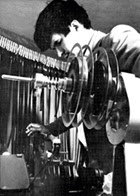Desistentialism

Some say Desistfilm is the third movie of Stan Brakhage. Some say it is his fifth or even sixth film. Anyway, the guy was twenty, and crazy about movies, as he would remain for all his life.
It seems that Desistfilm was made by chance. At least so it goes, the story. Brakhage had to project some movies at a party and there was not enough stuff to be shown. As he had four rolls of gun camera film from WWII, he decided to go to the party and shoot there a new movie on the spot.
Yvonne Fair was there, also James Tenney, and Walt Newcomb, Larry Jordan, Bob Benson and Alex Austin. By that time they were just a band of young beatniks, playing together in the movies of Brakhage (most of them had played in Unglassed Windows Cast a Terrible Reflection). Well, in that evening all of them were crazily drunk.
Bob Benson would continue to play in movies of Brakhage for some years, before switching to TV. Yvonne Fair and Walt Newcomb played wonderfully in a couple of movies made by Brakhage, then they gave up; unfortunately, their faces were so expressive. Larry Jordan would become well known in the circles of underground cinema with his animated collage films, and James Tenney would be one of the greatest names in the computer music.
Only in that evening all of them were totally drunk. And each one was there on its own, unable to observe the others. The music was crazy, the piano sounded like a saw cutting some metal. Some of them were trying to say something with inarticulate voices and were giving up immediately as no one was able to end a sentence and nobody was able to listen. Walt was trying to build a tower of books, in vain, Yvonne was trying to spool some wool, just to get caught in it. Larry was doing his best to light a cigarette, with four matches that he was trying to keep in one of his hands, arranged in some kind of a circle. Everyone was smoking heavily and drinking as these two seemed to be there the only things with some sense.
Bob was trying in vain to play a mandolin, then he gave up, unbuttoned his trousers and started to clean of lint his navel, probably as an act of increasing his inner knowledge through self awareness: it seems by that time he had profound existentialist views, so he could be certain only about himself.
Stan got quickly drunk by himself, and the camera became drunk, following drunkards with drunk eyes.
Well, that's the way the story goes. The story of how was made a six-minutes movie, at a party with drunk youngsters, sometime in the fifties, somewhere in Colorado.
It is a very important movie, for some reasons.
It is the first time when Brakhage's camera becomes definitely subjective. Instead of telling a story from outside, here the observer becomes part of the story; instead of seeing the scene from outside, here the camera becomes part of the scene: and so the movie is rather a story about the way the story is perceived. Brakhage did not know the movies of Dziga Vertov by that time, however he was following the same path.
It is the first movie of Brakhage where camera becomes truly part of himself, and he becomes part of his camera. And here Vertov comes again in mind. Only it is something special at Brakhage: if he is part of his camera, and camera is part of him, then camera enters his life and his life becomes his movies. You see his movies, you see him. And he would find the courage and the honesty to tell us everything, about birth and about death, about sex and all kind of intimacy, about fears and about enthusiasms, about craziness - and it would be impossible for him to do otherwise, because he was bound by his camera. And after many years, he would get rid even of his camera - his great movies of the eighties and nineties would be hand painted directly on the film. His immersion in the world of his movies would become total.
Darragh O'Donoghue considers that Desistfilm is a prototype horror movie, shot through with the quicksilver sensibilities of Cocteau and Epstein (Senses of Cinema). I would say that it is rather voyeuristic, as it carries an almost unbearable sense of intimacy. This is the great art of Brakhage: the closeness of filmmaker, camera and scene. Each one, filmmaker, camera, scene are observing each other with minutia. It results a universe where people, objects and time are alike, loosing any solid ground, floating somehow in space, behaving unexpectedly and being just scary; a universe where nobody can be in control; and it results a horrible feeling of claustrophobia and of paranoia.
And why this title, Desistfilm? Well, for the beat generation of the fifties, rebels without a cause, even existentialism wasn't worth to exist any more.
(By Brakhage)

0 Comments:
Post a Comment
<< Home